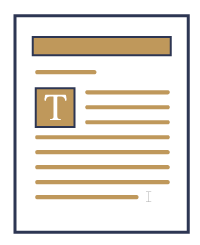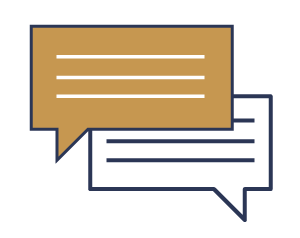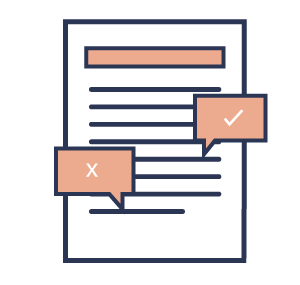Legal Writing Tips and Resources

Understanding legal writing is vital for all legal professionals. The ability to write in a concise, compelling manner is a skill that will be leveraged often for those interested in becoming a paralegal or becoming a lawyer. Legal briefs, memos and other legal documents require following certain style conventions and implementing legal reasoning skills.
This guide includes tips for improving your legal writing skills and additional resources on the subject.
Why Is Legal Writing Important?
Legal writing is used throughout all practices of law for a variety of documents. These can include:
Predictive writing
(e.g., objective legal memoranda)
Legal correspondence
(e.g., client advice and demand letters)
Persuasive writing
(e.g., motions and briefs)
“Legal writing is an important and integral skill,” said John Flynn, associate professor of law at Elon University School of Law.
Effective legal writing is especially vital for first-year law students as the rest of their courses are doctrine-focused.
“You need to learn what the law is and how it came to be, but in the first year, the only opportunity you really get to put any of that into action as a skill is legal writing,” Flynn said.
How to Improve Legal Writing Skills
There are a variety of resources available to individuals who are learning legal writing. Practicing the right techniques can also help students improve their skills in this area. Flynn and other resources recommended the following tips.

Talk to Your Legal Writing Instructors
Professors are a great resource for those enrolled in legal writing courses. They might be able to recommend reference books, practice activities and other helpful resources.
“Most legal writing professors, in my experience, are very accessible and very willing to help you with your writing,” Flynn said.

Reference Legal Writing Examples
According to Flynn, an easy way to learn more about writing certain legal documents is to look at relevant examples.
“If you’re trying to write a loan agreement or an employment agreement, you need to spend a lot of time looking at what has been done before that’s been tested, it’s been tried, and it works,” he said.
However, Flynn advised that students, particularly in the first year, should verify their professor’s policy on using materials and examples that are not provided in the course before they use outside references for assignments.

Don’t Procrastinate Legal Writing Projects
It’s important to allot an adequate amount of time when drafting a legal document because the process works best when there is time for revisions.
“[Legal documents] require drafting and redrafting, putting it down and coming back to it. You cannot throw something together the night before,” Flynn said.

Follow the Formula of Legal Writing
Legal writing can be formulaic, which may be a struggle for some. Flynn explained the IRAC method, which is used to compose legal documents:
1. Issue:
Identify the issue.
2. Rule:
Research the rule/law.
3. Application:
Apply the law to the set of facts.
4. Conclusion:
Reach a conclusion based on that application.

Summarize Your Conclusions First and Use Clear Headers
Readers may get fatigued, especially while reading a lengthy legal document. To ensure your point comes through, try summarizing your conclusions early on while you may still have the reader’s attention.
Using clear headings and topic sentences also allows readers to identify the topics you are addressing. Within each section, start each paragraph with a clear topic sentence to help readers understand what will follow.

Avoid “Legalese” When Drafting Documents
Flynn says there has been a shift in legal writing to make documents clearer and easier to understand for the layperson. When practicing legal writing, consider making some of the following language considerations:
INSTEAD OF
“for the duration of”
“for the purpose of holding”
“the reason that”
“forthwith”
TRY
“during”
“hold”
“because”
“immediately”
Eugene Volokh teaches a First Amendment amicus brief clinic at UCLA School of Law and has taught other courses on copyright law, tort law, criminal law and other subjects. He is also the author of the textbook Academic Legal Writing. Here, Volokh runs through common “legalese” clunkers to avoid and their simpler, more readable replacements. According to Volokh, “the replacements aren’t always perfect synonyms, but 90% of the time they’re better than the original.”
PlainLanguage.gov also offers additional information about using plain language in the legal profession.

Know Your Audience
According to the late Supreme Court Justice Antonin Scalia, knowing your audience (and connecting with them) is the key to good legal writing: “There is, however, a certain quality possessed by the really great writer—legal or otherwise—that has nothing to do with brainpower…the ability to place oneself in the shoe’s of one’s audience; to assume only what they assume; to anticipate what they anticipate; to explain what they need explained; to think what they must be thinking; to feel what they must be feeling.”

Avoid Adverbs and Passive Voice
Adverbs are words that modify an adjective, verb or adverb. In legal writing, consider whether the adverbs you use are unnecessary. Eliminating adverbs is one way to make legal writing more concise.
Active voice tells the reader who did what, and it may be more effective than writing in the passive voice. For example, you might want to rewrite “the lease was broken” as “the landlord broke the lease.” The University of Wisconsin-Madison’s Writing Center offers more information about passive versus active voice.

Edit, Edit, Edit
Spelling, punctuation or grammatical errors may undermine your credibility as a legal expert or professional. Ruthlessly edit your own work, and ask a colleague or trusted friend for a second set of eyes on any important documents.
Resources for Legal Writing
There are many resources available for those who are looking for additional guidance on improving their legal writing skills. In addition to the resources below, view this helpful list of legal writing books.
Click the links below to jump to sections with more information about different types of legal writing resources.
Legal Writing Books and Articles
ABA for Law Students: 10 Top Tips for Legal Writing
This article provides a variety of tips on how to improve your legal writing, focusing primarily on structure and word use. Hosted on the ABA for Law Students website, this resource was originally published in Temple ESQ, a publication of Temple University Beasley School of Law.
ABA Journal: 10 Tips for Better Legal Writing
Written by Bryan A. Garner, president of LawProse Inc., this entry from the American Bar Association’s ABA Journal includes strategies for effective revision of drafted documents, language choices, the research process and more.
American Bar Association: 10 Tips for Better Legal Writing
This blog post from the American Bar Association recaps a legal writing webinar featuring David Howard Spratt, professor of legal rhetoric at American University Washington College of Law, in the form of a list of tips for improving legal writing skills.
Cornell University Law School Legal Information Institute: Introduction to Basic Legal Citation
This introduction to basic legal citation was written by Peter W. Martin, the Jane M.G. Foster Professor of Law, Emeritus, former dean of Cornell Law School and co-founder of the Legal Information Institute. The website offers a series of video tutorials on citing major categories of legal sources, including judicial opinions, constitutional and statutory provisions, and agency material.
Lawyers Mutual Inc.: 10 Easy Tips for Powerful Legal Writing
The author of this article, Jay Reeves, touts more than 35 years of experience as a lawyer. Within his list of tips, he includes a variety of strategies for managing the legal writing process and creating engaging, effective documents.
Legal Talk Network: Tips for Exceptional Writing Skills
In an interview to discuss his book, Legal Writing Nerd: Be One, author Wayne Schiess offers readers recommendations for advancing their legal writing skills. The interview was originally recorded for a podcast, but the transcript is also provided, allowing visitors to the website to listen to or read Schiess’ advice on drafting legal documents.
The Oxford Handbook of Language and Law
Encyclopedic in scope, The Oxford Handbook of Language and Law outlines the role of linguistics across the range of legal areas and describes the tools and approaches used by linguists and lawyers in this field. This is a useful primer for non-lawyers interested in the relationship between language and law. The introduction (available for free) explains the aspects of legal language and the ways in which language and law interact.
The Balance Careers: 7 Ways To Improve Your Legal Drafting Skills
This resource is straight to the point and covers some of the basic foundations of effective legal writing. The Balance Careers website also provides other resources for aspiring legal professionals.
The Indigo Book was compiled by a team of students at the New York University School of Law, working under the direction of professor Christopher Jon Sprigman. The book covers legal citation for U.S. legal materials, as well as books, periodicals and electronic resources. According to Sprigman, “anyone using The Indigo Book will produce briefs, memoranda, law review articles and other legal documents with citations that are compatible with the Uniform System of Citation.”
Typography for Lawyers: Essential Tools for Polished & Persuasive Documents
Typography is the style and appearance of printed matter. According to Matthew Butterick, author of Typography for Lawyers, legal documents are professionally published material and “thus should be held to the same typographic standards.” Excerpts from the book are available for free online and include topics such as type composition, text formatting and page layout.
Legal Writing Online Tools and Resources
BriefCatch is a computer plug-in specifically developed for legal writing. The editing tool is designed to spot potential issues while drafting a document, including inconsistencies in spelling and punctuation and repetitive word use.
Cornell University Law School Legal Information Institute: Wex
Wex is a free legal dictionary and encyclopedia sponsored and hosted by the Legal Information Institute at the Cornell Law School. Wex entries are collaboratively created and edited by legal experts.
Grammarly is a free browser extension that helps writers assess their grammar, spelling, style and tone. While the tool is for general use, its editing functions can help keep the user’s writing clean and limit errors.
Anyone interested in improving their legal vocabulary can search legal terms and definitions on Law.com’s free online legal dictionary.
National Archives: Federal Register: Drafting Legal Documents
The Office of the Federal Register, a division of the U.S. National Archives and Records Administration, presents this free guide to legal writing to help agencies produce clear, enforceable regulatory documents. Although this resource is intended for federal agencies, others can access the guide to learn how to draft a set of regulations. Helpful topics include principles of clear writing, arrangement of legal documents and format requirements for regulatory documents.
NaturalReader converts text to audio automatically, allowing the user to listen to documents they have drafted. Hearing your writing out loud can make it easier to spot mistakes that might go undetected when re-reading copy.
WordRake is writing software that uses algorithmic rules to provide targeted feedback based on the writer’s needs. This digital resource can be helpful in writing more precise copy and avoiding spelling and grammatical errors.
Legal Writing Research Resources
CourtListener is a free legal research website containing legal opinions from federal and state courts. With CourtListener, lawyers, journalists, academics and the public can research an important case, stay up to date with new opinions as they are filed or do deep analysis using raw data. CourtListener is a project of the Free Law Project, a non-profit public benefit corporation that seeks to provide free access to primary legal materials.
Florida A&M University Libraries: Basic Legal Research
Legal research is one factor of competent law practice. This comprehensive guide from Florida A&M University Libraries explains the components of legal research, including issue spotting, jurisdiction, making a research plan and performing research in print and online.
Law Technology Today: Free Full-Text Online Law Review/Journal Search
This search engine searches for free full text from over 300 online law reviews and law journals, as well as document repositories hosting academic papers and related publications.
Supreme Court of the United States: Oral Arguments
Arguments are an opportunity for Supreme Court Justices to ask questions directly of the attorneys representing the parties to the case and for the attorneys to highlight arguments that they view as particularly important. The Supreme Court maintains argument transcripts and audio as far back as 2010.
When performing legal research, it’s important to understand the differences between mandatory and persuasive authority (or law). The UCLA School of Law explains the different types of authority and how to use them to find cases that support your position or argument.
As part of its mission to assist library users with legal research, the Thurgood Marshall Law Library at the University of Maryland Francis King Carey School of Law prepares guides to both general legal research and specialized courses. The Guide to Legal Research is a helpful primer on performing legal research using electronic research databases, legal periodicals, legal encyclopedias and other sources.
University of Washington School of Law: Gallagher Law Library Guides
The Gallagher Law Library at the University of Washington School of Law maintains a collection of free legal research guides spanning a wide range of topics, including administrative law, constitutional law, employment law, labor law, trademark law and more. Each guide includes free and commercial resources for conducting legal research.
U.S. Department of Justice: Supreme Court Briefs
A brief is a written argument that a lawyer or party to a case submits to the court before presenting oral arguments; it summarizes the facts of the case as well as the legal reasoning behind the arguments. The U.S. Department of Justice maintains an online database of more than 9,000 Supreme Court briefs spanning from 1985 to present.
Legal Writing Organizations and Blogs
A Lawyer’s Guide to Writing: Marie Buckley’s Blog
Marie Buckley is a lawyer, writing coach and author of The Lawyer’s Essential Guide to Writing: Proven Tools and Techniques. In addition to specific categories about different types of legal writing (e.g., letters, memos and briefs), the blog also provides tips on proofreading, research, grammar, design and efficient work habits.
Association of Legal Writing Directors (ALWD)
The Association of Legal Writing Directors is a nonprofit professional association of directors of legal reasoning, research, writing, analysis and advocacy programs from law schools throughout the United States. In addition to helpful resources such as the ALWD Guide to Legal Citation and Legal Communication & Rhetoric, a peer-edited journal dedicated to the substance and practice of professional legal writing, the ALWD also provides information on upper-level writing requirements at numerous U.S. law schools.
LawProse claims to be “America’s foremost provider of [Continuing Legal Education] training in legal writing, editing and drafting.” Its blog has hundreds of posts covering a wide range of topics designed to improve legal communications.
The Legal Writing Institute (LWI) is a nonprofit organization dedicated to “improving legal communication by supporting the development of teaching and scholarly resources and establishing forums to discuss the study, teaching and practice of professional legal writing.”
Ross Guberman is the author of Point Made: How To Write Like the Nation’s Top Advocates and Point Taken: How To Write Like the World’s Greatest Judges and was the 2016 recipient of the Legal Writing Institute’s Golden Pen award for making “an extraordinary contribution to the cause of good legal writing.” His blog, Legal Writing Pro, is full of insights, tips and resources for lawyers and non-lawyers alike who want to improve their written communication.
Scribes: The American Society of Legal Writers
Scribes (the American Society of Legal Writers) is a national organization of legal writers. Members include practicing lawyers, state and federal judges, law-school deans and professors, and legal editors. Scribes hosts annual Continuing Legal Education (CLE) seminars, publishes The Scribes Journal of Legal Writing and offers tips on legal research, writing and grammar.

